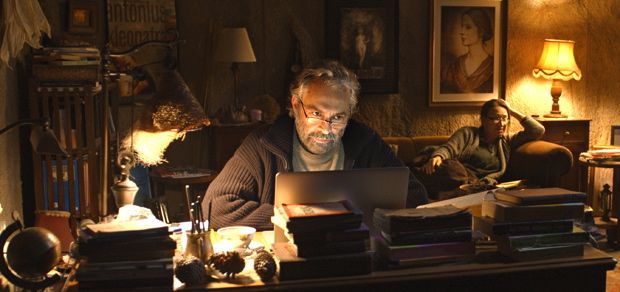
I had two minor, nagging concerns before entering the George Street cineplex to see Nuri Bilge Ceylan’s latest movie Winter Sleep in the final days of this years Sydney Film Festival. The first was whether the slated 190 minute showing time would hamper the work in any way, requiring a level of intense audience concentration that would potentially turn the viewing into a kind of endurance, perhaps an experience on par with the elemental strife undergone by Ceylan’s characters. The second was whether he’d be able to make a compelling successor to his previous masterpiece Once Upon a Time in Anatolia (this notwithstanding that Winter Sleep had already won the coveted Palme d’Or).
Within minutes it became clear to me how baseless my concerns were. To watch Ceylan’s new movie is to surrender to his masterful, subtle ability to recreate nature’s rhythms alongside our poorly synchronised emotional dramas, without its craftsmanship ever intruding into the vivid, self-imposed fates of its human leads. It is to surrender to his uncanny ability to render the mundane travails of human endeavour into something extraordinary across in its 3-hour runtime, making the audience acknowledge our nature as suffering and confused beings.
The winter sleep alluded to in the title is not necessarily focused on the seasonal decline, although we see life marred by inhospitable snow, sleet, wind and an omnipresent cold that chills the bones. Yet the setting goes beyond mere backdrop for narrative. The freezing unconsciousness of Nature, pregnant with a dim sense of anticipated renewal, is a character, its presence as a determining force in the outcomes of the characters beyond contestation. The characters stumble and sink in the snow-capped expanses while they hunt and travel between indistinguishable locales, tenuously gripping the black ice on the roads, Ceylan’s panoramic shots being etched out mercilessly by the rapidly falling pellets of sleet.
The winter sleep of Ceylan’s concern more precisely is the Spring in the affairs of our protagonists which, in naked contrast to the inevitability of nature’s cycles, seems to never arrive. Caught unawares in a permanent winter of their discontent, we witness the characters become increasingly defined by their hibernation – the mute, slow-burn diegesis clasping otherwise recognisable human beings in an interminable folly. Winter Sleep is a rueful meditation on what could be, but never is, in human life, a raison d’etre for art if there ever was one.
There is of course a story. It centres around the material and non-material (mis)fortunes of a retired, wealthy actor Aydin (Haluk Bilginer) who owns and runs a mountainside hotel somewhere in Anatolia. Within the furnished cavern of the hotel, surrounded by the undulating nothingness of Anatolia, his dwindling relationships to his young, wilted wife Nahil (Melisa Sozen) and his recently divorced sister Necla (Demet Akbag) are explored with a brutal candour, wherein the familiarity of family is rent open to reveal decades of pent-up bitterness, regret and hostility. Aydin, the aesthete and well-off king of the lesser Anatolian bumpkins, is portrayed as a sanctimonious, callous proprietor, out of touch with everything but his standing in his own eyes. This is explored quite devastatingly in relation to the fate of a destitute family that are his tenants, beset by money woes, and presided by the bilious alcoholic father, unable to reform himself and his family’s troubles, and the grovelling, grinning Imam and uncle who is arrogantly lampooned by the all-knowing Aydin in a regular community column he writes, in between deluding himself on the progress of a book he’s planning to write on Turkish theatre.
Yet it’s remarkable how much this film feels like a single still or photograph, suggesting a kind of eternal ennui in the flawed human travails in Eastern Turkey. Lacking a contrived narrative wholeness or resolution, it feels as if Ceylan is delivering something akin to a Brueghel painting, depicting the arduous upkeep of people swallowed up by their environs. The allusion is more than suggestive: in a nod to the great Russian master Tarkovsky, another great fan of Brueghel, Aydin purchases a wild, quicksilver stallion in order to optimise the marketability of his hotel to tourists visiting Cappadocia. In one of the most sublime, impressionistic scenes of the film, the horse, having languished in a stable, is finally set free to disappear into the shadowy tract. However such an act of liberation is only possible with Aydin as a silhouette, for when lit by the flickering flames of his wife’s hearth, he regresses to his patriarchal, didactic nonchalance to the woman he loves the most.
The film is praiseworthy for how much it simply lets the characters speak, and how reverently it allows the master actors to work their craft and hone the script. The dialogue is what sets the dreary pace and attests to the languor of hillside life, with conflicts allowed to rise without force. In one of the most important scenes of the film, simply taking place in Aydin’s study, Necla tells him “I wish my threshold for self-deception was as low as yours”. Indeed, this film maybe seen as a meditation on the sin of pride, connected to denial, that so comprehensively tethers all of the characters to their narrow perspectives. In this respect, the film is all the more remarkable for having produced such riveting drama, even though, in effect, nothing of consequence happens: by the end of the film, no debts are repaid, no schools are renovated, no love is rekindled or mistakes forgiven as humans trudge around an absent centre. Aydin’s irremediable self-satisfaction at his actions is nothing but tragic, as he once again elects to continue his big sleep. But this kind of art, art at its finest and most remorseless, it may grant us an immense gift and wake us up.
